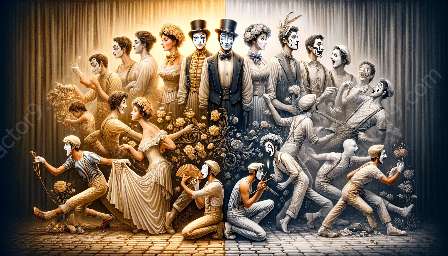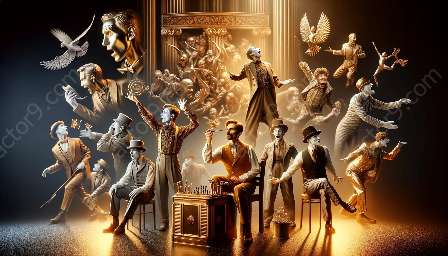Acting is a craft that requires not only talent and skill, but also a deep understanding of human nature. Among the many tools at an actor's disposal are the art of mimicry, mime, and physical comedy. These techniques not only entertain audiences but also help actors develop a profound sense of empathy. In this article, we will explore the fascinating connection between mimicry and the development of empathy in actors.
The Art of Mimicry
Mimicry is the art of imitating another person's voice, mannerisms, and behavior. It is a fundamental skill for actors, allowing them to realistically portray a wide range of characters. This ability to mirror the actions and emotions of others gives actors a unique insight into human behavior. By mastering the art of mimicry, actors can gain a deeper understanding of the intricacies of human interaction, enabling them to better connect with their characters and audiences.
Mime and Physical Comedy
Similar to mimicry, mime and physical comedy are performance techniques that rely on non-verbal communication. Mime involves the use of gestures, facial expressions, and body movements to convey emotions and narratives without using words. Physical comedy, on the other hand, focuses on exaggerated movements and comedic timing to elicit laughter from the audience. Both of these techniques require actors to observe and replicate real-life actions and emotions, honing their ability to empathize and relate to the experiences of others.
Empathy in Acting
Empathy is the capacity to understand and share the feelings of another person. For actors, empathy is crucial for creating authentic and compelling performances. Through the practice of mimicry, mime, and physical comedy, actors develop a heightened sense of empathy as they immerse themselves in the perspectives and emotions of various characters. This process allows actors to transcend their own experiences and connect with the universal aspects of human emotion, resulting in performances that resonate deeply with audiences.
Developing Empathy Through Performance
As actors strive to embody the emotions and experiences of their characters, they naturally cultivate empathy through their performances. By delving into the psychology and motivations of their roles, actors gain a profound understanding of the human condition. This intimate engagement with diverse perspectives and emotions fosters empathy, enabling actors to authentically convey the depth and complexity of the human experience on stage and screen.
The Intersection of Mimicry and Empathy
The symbiotic relationship between mimicry and empathy is evident in the art of acting. Through mimicry, actors learn to mirror the behaviors and emotions of others, cultivating a deep sense of understanding and connection. This process not only enhances their performances but also facilitates the development of empathy, allowing actors to embody the essence of human experiences with authenticity and compassion.
Conclusion
Mimicry, mime, and physical comedy serve as powerful tools for actors to develop empathy and insight into human behavior. By honing their ability to mimic, observe, and empathize with a wide array of characters, actors not only enhance their craft but also contribute to a deeper understanding of the complexities of the human experience. The union of mimicry and empathy fuels the art of acting, enabling actors to touch hearts and minds with their profound portrayals of the human condition.


























